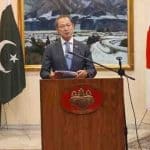ISLAMABAD, Nov 04 (APP):Strengthening multilateralism that promotes collective security and mutual collaboration without any discrimination will lead to a “just global order,” said Federal Minster for Human Rights Dr: Shireen M Mazari addressing the 7th Istanbul Security Summit in Istanbul here on Thursday.
She said “We need to strengthen multilateralism that promotes collective security of everyone rather than pushing a zero-sum approach,” Pakistan’s Minister for Human Rights Shireen Mehrunnisa Mazari said, addressing the 7th Istanbul Security Summit in Istanbul.
Mazari said all those who violate international law and UN Security Council resolutions, and carry out human rights violations should be “held accountable without discrimination.”
“In order to promote a just global order, same yardstick and benchmark should be promoted across organizations, and in emerging technologies and strategic areas. Carving out exemptions should be avoided,” she stated.
Mazari further said that “strong Muslim states were being destabilized while UN Security Council’s role was being undermined by the notion of ‘coalitions of the willing’.
“The commitment to democracy has been selective and sporadic. Since 1990, democracies have been responsible for more deaths globally, ironically in promotion of democracy, than any other dispensation.”
Calling out “self-proclaimed flag bearers of democracy,” the Pakistani minister said they are “responsible for some of the most extreme violations of basic international laws.”
“Not only that, they have become more brazen in their use of force, legislative and constitutional fraud, disinformation to not only perpetuate their illegal occupation but throw the onus on the occupied people,” she said, referring to India’s actions in disputed Jammu and Kashmir region.
Referring to the Quad security alliance, Mazari said: “Great power rivalry is on the rise as reflected in increasing defense budgets and new strategic blocs resulting in greater militarization of different regions – the US-India-Japan-Australia Quad being one such example which is seen as a direct strategic threat to China, especially with the provision of the US (and the UK) nuclear submarines to Australia.”
“This deal (called AUKUS) itself is a final nail in the coffin of the Non-Proliferation Treaty (NPT),” she added.
Saying that the geopolitics continue to play an “important role,” Mazari argued that Pakistan, being the next-door neighbor of Afghanistan, “never had the luxury to disengage – regardless of who has been ruling in Afghanistan.”
“Despite billions being spent, no stable governance infrastructure or a strong security setup was established. So today we are seeing a major humanitarian crisis in Afghanistan,” she said, inviting the attention of the international community to the developing humanitarian situation in Afghanistan.
She said the government of Prime Minister Imran Khan placed “a special emphasis on geo-economics – expanding regional connectivity to bring about economic prosperity and development to our region.”
“However, for this to happen we realize the centrality of regional peace. So, we see geo-economics linked to geo-politics through an alternate paradigm of peace and cooperation,” the Pakistani minister said.
Follow the PNI Facebook page for the latest news and updates.









